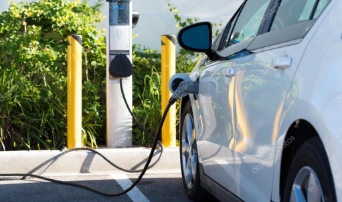There are a number of exciting developments on the horizon in the field of electric car charging, both in terms of technology:
In the rapidly evolving world of electric vehicles, the field of electric car charging is experiencing significant advancements. These innovations in technology are poised to revolutionize the way we charge our electric cars, offering faster charging speeds, wireless charging capabilities, vehicle-to-grid (V2G) technology, and battery swapping as alternatives to traditional charging methods.

One of the most notable challenges faced by electric car owners is the time it takes to charge their vehicles. However, researchers and engineers are diligently working on new technologies that could drastically reduce charging times. Solid-state batteries, for instance, have shown great promise in this regard. Compared to the hours required to charge current lithium-ion batteries, solid-state batteries have the potential to charge an electric car in a matter of minutes. This development would be a game-changer, significantly improving the convenience and practicality of electric vehicles.
Wireless charging is another groundbreaking technology that holds immense potential for electric car owners. Imagine being able to charge your vehicle without the need for physical plugging. With wireless charging, electric cars can simply park over charging pads embedded in the ground, and the charging process will commence automatically. This innovation not only provides added convenience for drivers but also eliminates the risk of accidents caused by people tripping over charging cables. With wireless charging, the charging infrastructure can be seamlessly integrated into parking lots, roadways, and even garages, making EV ownership even more accessible and hassle-free.
Vehicle-to-grid (V2G) technology represents a significant leap forward in the sustainable use of energy. This concept enables electric cars to serve as mobile power plants by utilizing their batteries to store excess energy during off-peak hours. The stored energy can then be sold back to the grid during peak demand periods, effectively balancing the electricity grid and reducing reliance on fossil fuels. V2G technology not only benefits electric car owners by providing an additional revenue stream but also contributes to a more stable and sustainable energy system.
Battery swapping offers an alternative approach to traditional charging methods. Instead of waiting for a vehicle to charge, battery swapping involves quickly replacing a depleted battery with a fully charged one. This approach significantly reduces charging time and addresses concerns about limited charging infrastructure. However, for battery swapping to become widely adopted, standardized battery designs and infrastructure are crucial. With a standardized battery format, swapping stations can efficiently service a variety of electric car models, enhancing the convenience and accessibility of electric vehicle charging.
From a personal perspective, the advancements in electric car charging technology are truly exciting. As an advocate for sustainable transportation and a firm believer in the potential of electric vehicles to mitigate climate change, witnessing these developments instills a sense of optimism and hope. The prospect of faster charging speeds brings us closer to eliminating range anxiety, making electric cars a viable option for long-distance travel. Wireless charging technology, with its seamless and hassle-free experience, has the potential to make electric vehicle ownership even more convenient, enticing more individuals to transition to sustainable transportation. V2G technology not only benefits electric car owners but also contributes to the overall stability of the energy grid, fostering a cleaner and more sustainable future. Finally, battery swapping addresses the concerns surrounding charging infrastructure and provides a practical solution for those who require quick charging times. The continued advancements in electric car charging technology are undoubtedly paving the way for a more sustainable and electric future.
In conclusion, the field of electric car charging is witnessing remarkable technological advancements that have the potential to transform the way we charge our electric vehicles. Faster charging speeds, wireless charging, V2G technology, and battery swapping all offer exciting possibilities for improving the convenience, efficiency, and accessibility of electric car charging. These developments, combined with a personal perspective on the significance of sustainable transportation, highlight the immense potential of electric vehicles to reshape our transportation systems and create a greener future for generations to come.

